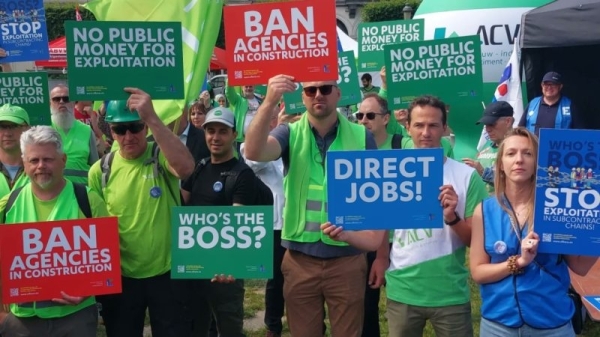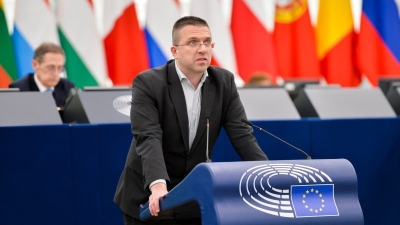Working conditions will be priority in EU elections, lawmaker says

The issue of workers’ rights in projects financed with public money will be a central issue in the next EU election campaign, centre-left EU lawmaker Agnes Jongerius said, as workers from the construction sector protest an increase in social dumping.
On Wednesday (7 June), 250 construction workers protested in front of the European Parliament, calling for stricter conditions on subcontracting in the construction sector, which opens the door for many forms of exploitation in the view of trade unions.
In the view of Jongerious, coordinator of the centre-right S&D group for employment and social affairs, this issue will be among the key points discussed in the upcoming EU election campaign, particularly when it comes to public contracts, such as for the construction of schools, social housing or roads.
“We spend quite a lot of money, also from the European level,” Jongerious told EURACTIV. However, most of those procurements do not yet have social conditions attached, she said, as EU rules do not oblige member states to do so.
“So I think this is the time to, also at the European level, push for social conditionalities,” she said. This would not only benefit workers in the construction sector, but as construction receives many contracts from public authorities, it would be among the main targets.
“It’s now time to put your money where the law is,” she said, hinting at the EU’s minimum wage directive. This law obliges member states to lay out a strategy for increasing the level of collective bargaining in the overall economy. According to Jongerius, one potential solution to achieve this would be to make collective agreements mandatory for all state-funded projects.
Some countries would already go in that direction, Jongerious said, citing Germany and Portugal as examples.
“So I think we are building momentum,” she said, “and we need also the momentum of the next election campaign to push further”.
Exploitation in the construction sector growing
In recent years, “the number of cases of exploitation in construction sites is growing,” Jongerius said, which was also due to the increase in subcontracting.
“On construction sites from 20 years ago, people were from the same company, they were on the paylist of smaller or even the big multinational construction companies,” she said. “But nowadays, it’s more and more common practice that people are working for the big companies but are not on their paylist.”
“If you talk to people inside their coffee room, there are people from different nationalities, different companies, some people being so-called self-employed,” she said.
While subcontracting would not be criminal per se, “if you are using subcontracting chains, there is a possibility of reducing costs by simply escaping legal responsibilities,” she said.
“That also leads to a situation where it’s often quite difficult to pinpoint who is the one to pay the proper wages and who is the one to pay the social contributions,” she said, adding that this would open the door for “criminal behaviour”.

Union boss: EU single market boosts exploitation of construction workers
As the EU celebrates 30 years of its single market and freedom of movement, for construction workers, there are many problems associated with it, according to union boss Johan Lindholm.
Limiting layers of subcontracting “legally difficult”
One key demand of construction workers’ unions is to limit the number of subcontracting layers that can be used.
Patrick Vanderberghe, president of the Belgian trade union ACV-SCS told EURACTIV that “when you have too much subcontracting, 4th, 5th, 6th level, more and more criminality is being introduced”.
“The big problem is that the chain is really long, and the employers and the national authorities are not keen to limit it. That’s why we have to limit subcontracting to two levels,” he added.
While voicing her general support for this idea, Jongerius said, “legally, it’s quite difficult to make this possible.”
However, “legally, we can arrange legislation, which says, even if you’re using a subcontracting chain, it should be clear that you should also pay people the proper salaries, the social contribution, so equal pay also when posting in the subcontracting chain”, she added.
Furthermore, a “construction site ID” should be introduced, allowing for better enforcement of existing laws by merging all information about workers and their legal employment situation on a given construction site.
Initially, this was even part of the agenda of the previous Commission, Jongerius said, but “they never made a proposal”.



